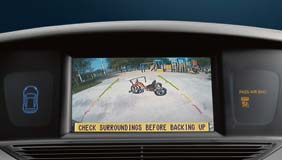The Obama administration is again delaying regulations on whether new cars and trucks must come equipped with rearview cameras to protect against drivers backing over people in blind spots behind their vehicles, a victory for automakers who say requiring the cameras is too costly.
Transportation Secretary Ray LaHood said Thursday in letters to three members of Congress that more research is needed. He set a new deadline of January 2015 for the regulations.
An average of 228 people are killed and 17,000 injured each year because of back-over accidents. Many of the accidents occur in driveways and parking lots. Nearly half the deaths involve children under age 10. The elderly also frequently are victims.
The emotional toll of the accidents is especially high since many of the drivers are parents or family members of those killed and injured.
Congress passed a law in 2008 requiring the government to issue final regulations aiming at protecting against back-over accidents by Feb. 28, 2011, and that the changes be in place for model year 2014 vehicles. But the regulations have been delayed repeatedly.

The law didn’t require that cars and trucks come equipped with cameras in the rear of the vehicle that display images on a dashboard screen provided another solution could be found. But after studying the issue, the National Highway Traffic Safety Administration said cameras were the best solution and recommended more than two years ago that they be required on all new cars and trucks. The safety administration has estimated that making rear cameras standard on every car would add $58 to $88 to the price of vehicles already equipped with dashboard screens and $159 to $203 for those without them.
The auto industry has opposed requiring cameras on all vehicles, saying it would cost automakers $2.7 billion annually. Many vehicles already come with the cameras as standard or optional equipment.
“I am deeply disappointed by the administration’s foot-dragging over a rule that could help save the lives of hundreds of young children and prevent thousands of heartbreaking injuries,” said Sen. Jay Rockefeller, D-W.Va., chairman of the Senate Commerce, Science and Transportation Committee.
“The fact is simple – we know installing rear cameras in cars will prevent injury and death,” he said. “The administration needs to move forward with this common sense safety measure because children’s lives are in jeopardy.”
Automakers say it should be up to consumers whether they want to pay for rearview cameras or one of the many other new safety systems being offered as optional equipment in many new cars. They’ve also urged limiting any requirement to new trucks, rather than both cars and trucks. Many new trucks already come with the cameras as standard equipment.
“Automakers are providing cameras in cars today for greater vision and for new driver assists, and consumers should decide how best to spend their safety dollars. This is a decision for consumers,” said Gloria Bergquist, vice president of the Alliance of Automobile Manufacturers.
Forty-four percent of 2012 models came with rear cameras standard, and 27 percent had them as options, according to the automotive research firm Edmunds. Nine in 10 new cars had console screens available, according to market research firm iSuppli, which would put the price of adding a camera on the low end of the NHTSA’s estimates.
LaHood said in his letter to Rockefeller, House Energy and Commerce Committee Chairman Fred Upton, D-Mich., and Sen. John Thune, R-S.D., that the regulations are “important to the department due to its focus on enhancing the safety of our children.”
“Thus, it is especially important in this case for the department to ensure that all aspects of the rule are supported by robust analysis and that any additional societal impacts are examined,” he wrote.
In the meantime, absent regulations, the safety administration said it planned to update its list of recommended safety features to encourage consumers to purchase cars with the cameras.
Was this article valuable?
Here are more articles you may enjoy.

 Why 2026 Is The Tipping Point for The Evolving Role of AI in Law and Claims
Why 2026 Is The Tipping Point for The Evolving Role of AI in Law and Claims  FM Using AI to Elevate Claims to Deliver More Than Just Cost Savings
FM Using AI to Elevate Claims to Deliver More Than Just Cost Savings  UBS Top Executives to Appear at Senate Hearing on Credit Suisse Nazi Accounts
UBS Top Executives to Appear at Senate Hearing on Credit Suisse Nazi Accounts  Credit Suisse Nazi Probe Reveals Fresh SS Ties, Senator Says
Credit Suisse Nazi Probe Reveals Fresh SS Ties, Senator Says 